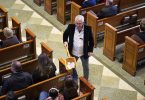New vocal ensemble to sing Tenebrae service at Church of the Nativity on April 19
by Elizabeth Blanchard Hills
Special to The Leaven
LEAWOOD — Jared Ostermann says singing Renaissance music is like drinking beer.
“Asking if I want to sing polyphony is like asking if I want a nice microbrew beer. The answer is always a resounding ‘yes,’” he joked.
Ostermann, 27, is the founder and director of a newly formed vocal ensemble named Sursum Corda, which is Latin for “Lift Up Your Hearts.” The group specializes in singing sacred Renaissance polyphony.
Sursum Corda will perform the Tenebrae service on April 19 at 8 p.m. at the Church of the Nativity, 3800 W. 119th St., Leawood.
Polyphony, which means “many sounds,” is a form of music in which a number of melodies work together to form a cohesive whole. The experience for singers is very different from the typical choir situation, in which the sopranos have the melody and the lower voice parts provide harmony in support.
In polyphony, every voice part is equally important and has its own unique melody for the singers to shape expressively. As one melodic line reaches a high point, another may be growing softer; duets or trios emerge for a few bars and then disappear — the focus is constantly shifting. This complex fabric of interwoven melodies gives Renaissance polyphony a mysterious and fascinating beauty — a quality that continues to inspire both listeners and performers.
And just like a good microbrew, Ostermann says good polyphony can be both convivial and transcendent. Unlike many other types of choral music, polyphony does not depend on a conductor to shape the performance.
Ostermann urges his singers to move beyond needing him. Instead, they are encouraged to listen carefully and blend with one another to make many voices sound as one. He was pleased with the group’s sound after a recent rehearsal.
“There were several moments when we were all singing without any conducting, looking at each other, and having a good time with the interplay of voices,” he said. “That feeling is something we want every time we sing.”
Michael Podrebarac, consultant for the liturgy office of the Archdiocese of Kansas City in Kansas, is especially pleased that a vocal ensemble of Sursum Corda’s caliber is now performing throughout the archdiocese, as well as participating in sacred liturgies.
“I think it’s very exciting to have Sursum Corda in the archdiocese,” he said. “It adds a much-needed voice to the notion of sacred music in our archdiocese. Not only does it provide beautiful music, it serves as a role model for our parochial parish choirs.”
Sursum Corda has been rehearsing for the Tenebrae service since early February. Singer Erin Ronin finds being a member of the group both challenging and rewarding.
“I put the music on my computer during work hours just so that I can get that special sound into my head,” she said. “People walk by and they are fascinated — they are just drawn to the complexity and the beauty of polyphony.”
Tenebrae, the Latin word for “darkness,” is a traditional Holy Week service of the Catholic Church, with a special emphasis on the passion of Christ. The service is unique in its interplay of light and dark, as candles are gradually extinguished after each reading, lesson, or psalm.
In the end, Christ’s death and resurrection are represented in the removal and eventual reappearance of the last candle. The great composers of the Renaissance wrote some of their most profound music for the Tenebrae devotion, transforming a meditation on Christ’s suffering into one of the most beautiful moments in the church year. Sursum Corda will perform settings of the “Lamentations of Jeremiah” by Palestrina and Victoria, as well as Gregorio Allegri’s famous “Miserere.”
“The service is a wonderful opportunity to remember Christ’s passion, as we conclude our Lenten observances and prepare for the joy of Easter,” said Ostermann. The performance is free and open to the public. For information, go to the Web site at: http://sursumcordapolyphony.org.






